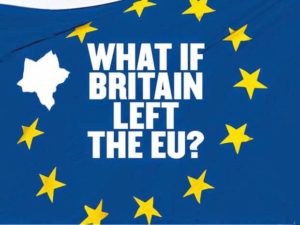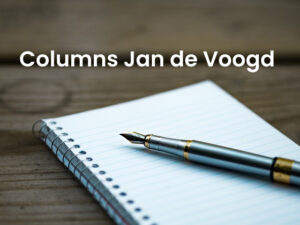
Dit is het tweede van twee alweer wat oudere berichten, die nog voor Brexit een feit was een analyse geven van de gevolgen. In dit artikel de gevolgen voor EU onderdanen die in de UK wonen of daar naar toe willen gaan. In het vorige artikel worden de gevolgen beschreven voor UK onderdanen die in een (ander) EU land wonen of daarheen willen.
Helena Wray, Reader in Law at Middlesex University and editor of Journal of Immigration Asylum and Nationality Law.
As the election approaches and the Conservative Party flirts ever more extravagantly with leaving the EU, it is a good moment to reflect on what life would be like after an exit for the 2.3 million EU citizens already living in the UK and for those who might wish to come in future.
As Steve Peers pointed out in his blog entry on the effects of exit on UK citizens living in Europe, immigration from within the EU has become one of the major causes of grievance for Euro-sceptics particularly since the accession of poorer Eastern European states (the irony is that it was the a Euro-sceptic government headed by Margaret Thatcher that promoted enlargement of the EU to include Eastern Europe). The difficulty for them however is that a pick-and-mix approach, in which French, Italian or German EU citizens can continue to enter freely but Czechs, Romanians and Bulgarians cannot, will be the most difficult outcome to achieve.
The possible options are:
1. The UK becomes a member of the European Economic Area or negotiates an agreement similar to that between the EU and Switzerland, permitting free movement for workers, self-employed and self-sufficient (including students) on a non-discriminatory basis. This possibility is regularly canvassed as part of a looser free-trade arrangement after exit. These arrangements however include the free movement rights that exist within the EU and their replication could well be made a precondition by the EU for any broader free trade agreement. However, it is precisely these rules that have proved so contentious because they permit the entry of EU citizens from the poorer, mainly Eastern European member states. Even if some negotiation were possible, the EU would not agree to an arrangement that discriminated between the different EU member states. In order to maintain the free entry of prosperous German and French citizens, the UK would still have to permit the admission of the apparently unsuitable Bulgarians and Romanians. It would also have lost most of its ability to influence the overall direction of free movement laws.
2. The UK negotiates bilateral free movement or other agreements with individual member states. This seems an unlikely scenario given the cumbersome and time-consuming nature of such proceedings, and the likely unwillingness of member states to enable the UK to use such a divisive tactic after the disruption of an exit. If they did take place, negotiations would have to proceed on the basis of reciprocity to be politically acceptable and member states are bound by the EU’s immigration policy on visas and admissions which provides a minimum floor of rights for third country nationals in certain situations such as long residence or in cases of family reunification; these would therefore have to be reflected in the UK’s own laws at least so far as these states are concerned. While these EU rights may be less open than those the UK would be ready to offer to the most prosperous member states, that would not necessarily be the case for poorer states. As an EU member state, the UK has succeeded in maintaining its opt-out from the EU’s immigration policy towards third country nationals. There is an irony in the prospect of the UK finding itself bound by such laws, at least in respect of some countries, as a consequence of exit.
3. More likely than the second possibility and more satisfactory in immigration control terms than the first is for the UK to apply its national immigration laws to all EEA citizens and it is this scenario that will be considered in the rest of this blog entry. Legally speaking, such a change would not be difficult to make, requiring only repeal of s 7(1) of the Immigration Act 1988, which provides that leave to enter or remain in the UK under the Immigration Act 1971 is not required by a person who is entitled to enter the UK by virtue of EU rights. The practical consequences however would be enormous.
EU citizens (and their family members) already in the UK:
In practice, it is likely that the position of these individuals would be agreed during the negotiations for exit. If not, those who already possess the right to permanent residence might retain that status or be switched to indefinite leave to remain. Indefinite leave offers fewer protections against deportation than permanent residence and this would raise some interesting questions under both human rights (assuming the UK remained party to the Convention) and domestic law in the event of an attempt to deport. Those who had not yet met the conditions for permanent residence could, in theory, be required to qualify under domestic law or face removal. This is likely to be difficult for most given the narrowness of domestic law as discussed below. Removing or changing the status of these individuals is likely to lead to legal challenges as they see their plans to live in the UK long-term demolished or the terms of residence adjusted to their detriment long after they had acted in the expectation of a particular route to residence (see, for example, the cases of R (on the application of HSMP Forum Ltd) v SSHD [2008] EWHC 664 (Admin) and R (on the application of HSMP Forum (UK) Ltd) v SSHD [2009] EWHC 711 (Admin)). Given this and the numbers involved, the government would have to find an acceptable policy for dealing with these individuals. It is likely therefore that most of those EU citizens who are already exercising their Treaty rights in the UK would be permitted to remain while they continue to exercise those rights, with the prospect of obtaining permanent residence or indefinite leave in due course. Those who are not exercising their rights, usually the unemployed, would however become easier to remove permanently as they would no longer have enhanced rights under Directive 2004/38. The interpretation of free movement rights would therefore continue to be relevant for many years following exit, although the UK would be unable to influence either its legislative or jurisprudential evolution.
EU citizens (and their family members) who wish to come to the UK:
These individuals would be subject to the full force of British immigration law, in particular the immigration rules. While these are binding on the government, thereby providing some measure of predictability, they are byzantine and change repeatedly. Applications are expensive to make and carry a high risk of refusal, particularly from poorer countries. Evidential requirements are complex and highly prescriptive. Appeal rights are limited and are set to be restricted still further when new provisions in the Immigration Act 2014 are implemented. Applicants whose exclusion is deemed conducive to the public good, who have been convicted of criminal offences (other than minor ones), have made or been the subject of false representations or have previously breached immigration control (except in minor ways) will be refused as may those who provide incomplete information or documentation, have committed a recent minor offence or whose admission is viewed as problematic in other ways. Once present in the UK, they remain liable to deportation in a range of circumstances.
The process of entering the UK would become more complicated and time-consuming, even for a for a short meeting or weekend visit. While some EU member states may be exempted from visa requirements for visits, they would still need to satisfy the immigration authorities on entry and all EU citizens would be subject to the long queues at entry points that are currently faced by those from outside the EU. In theory, EU citizens could be asked to establish that they meet all the requirements for entry as a visitor to the UK, including funds, intention to return and lack of intention to work, before being admitted.
All EU citizens would need to obtain a visa if they wish to come to the UK for long term purposes such as for work, study or family reunification. This is expensive and requires the supply of biometric information. It is often difficult to meet the substantive criteria for entry in these categories, a consequence of the current policy to reduce net migration.
Work and Self-Employment:
Opportunities for unsponsored highly skilled migration under Tier 1 have now almost entirely disappeared. The ‘Exceptional Talent’ scheme permits a maximum of 1,000 admissions a year by those who are already world leaders or likely to become so in their field. Entrepreneurs with access to capital may enter to establish a business as may those with very large sums of capital (at least £1 million) available for investment. Most admissions for work are now under Tier 2 of the Points-Based System. This requires an approved sponsor, a minimum salary and a job offer either in a shortage occupation or a post which has already been advertised to the domestic job market and failed to recruit. Temporary employment and artistic and sporting engagements are covered by Tier 5 and also require a sponsor. The over-elaborate requirements of Tier 5 have been widely criticised as inhibiting cultural and other exchanges, problems which would now affect all those coming from the EU as artists, sportspeople religious workers or charitable volunteers.
Study:
Students coming from the EU would no longer be eligible for home fees or loans and would have to obtain a student visa under Tier 4. They would have to be sponsored by an approved institution, may enter only for full-time courses and may spend only a certain number of years in the UK as a student. They would also need to meet the criteria for the issue of a student visa including the financial requirements, showing that they or their parents have access to thousands of pounds held in approved bank accounts and that they can speak English to the satisfaction of the entry clearance officer. They would be able to work only as approved by the terms of the student visa and their sponsor would have to monitor their attendance and report suspected non-compliance in the same way as for non-EU students.
Family:
It is now almost impossible for an elderly parent or other dependent relative to enter the UK to live with a UK-settled sponsor and this would apply to EU citizens who wish to join their adult children or other family members in the UK. Children could still join both parents, subject to financial and accommodation criteria, but, where one parent lives outside the UK, it would no longer usually be possible for an EU citizen child to join the UK parent. EU spouses and partners would be required to establish the genuine nature of their relationship and their intention to live together. The provisions in the Immigration Act 2014 which provide for the investigation of suspected sham marriages and possible prohibition of the marriage would also apply to marriages involving EU citizens. Partners would have to show adequate accommodation and that the UK sponsor earns at least £18,600 pa, demonstrated in the manner required by the rules. As almost half of the UK population is unable to meet the income requirement (more in many regions), it would become much more difficult for UK citizens marrying EU citizens to live with their partner in the UK.
Indefinite leave:
It is usually more difficult to obtain indefinite leave to remain under domestic law than it is to obtain permanent residence under EU law. As already mentioned, there is a greater liability to revocation of indefinite leave and deportation than under EU law. It is therefore a less secure status than permanent residence.
Conclusion
Those advocating the exit of the UK from the EU as a solution to unwanted intra-EU immigration do not seem to have grasped the unpalatable nature of the alternatives even in the terms of their own anti-immigration agenda. Maintaining the benefits of free access to Europe for UK citizens will almost certainly involve accepting inward movement from the entire EU on terms which are similar to those existing today but accompanied by the loss of influence that an exit implies. Alternatively, the UK can choose an isolationist position and apply domestic immigration controls to EU citizens. The price will be the loss of innumerable business, educational and cultural opportunities as movement from Europe becomes more difficult, and likely increased difficulties for UK citizens who may no longer take for granted their own privileged access to Europe for work, education, holidays or retirement.
Barnard & Peers: chapter 2, chapter 13
(Lees hier het andere artikel over de positie van UK onderdanen in een (ander) EU land na ‘Brexit’).
Bron: EU Law Analysis blog, 17 juli 2014



0 reacties